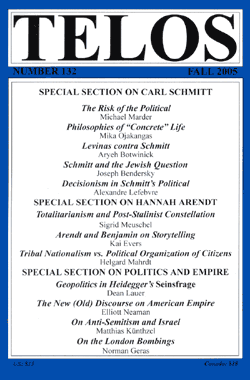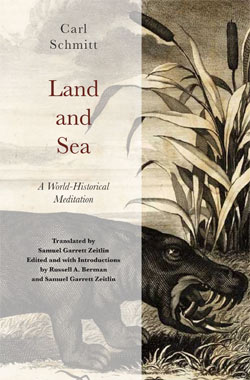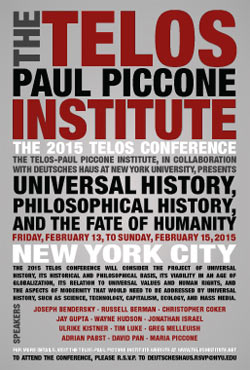By Flaminia Incecchi · Tuesday, June 7, 2016 In “On the Political: Schmitt contra Schmitt,” Benjamin Arditi is occupied with the task of revitalizing Carl Schmitt, to open or retrace various interpretative paths that allow us to use Schmitt in trajectories that he did not envisage or did not pursue. Arditi takes his reader by the hand into an exploration of a series of issues arising from Schmitt’s theory: disputes regarding the bellicose nature of the political, the identification of politics in the political, the charge of formalism, and the normative dimension of order.
Continue reading →
By Simas Čelutka · Tuesday, February 23, 2016 In his essay “Carl Schmitt on Friends, Enemies and the Political,” Andrew Norris inquires into the question that I have been interested in for quite some time: political friendship in Carl Schmitt’s political philosophy. Schmitt’s interpreters usually focus on the issue of enmity in his concept of the political, not least because Schmitt himself elaborates on the existential significance of political enmity much more extensively. From a conceptual point of view, however, political friendship should be viewed as at least equally relevant a part of Schmitt’s account of the political. The specific criterion of the political is famously the distinction “between friend and enemy,” not simply an indefatigable presence of political enmity. Norris should be lauded for his attempt to foreground a crucial, though still insufficiently explored, notion of a political (public) friend in Schmitt’s Concept of the Political.
Continue reading →
By Simas Čelutka · Wednesday, January 27, 2016  Today’s world is witnessing a noticeable intensification of hostilities and confrontations on many fronts of international relations. A revisionist and neo-imperialist Russia, annexing Crimea and staging a cynical proxy war in Eastern Ukraine in 2014, is challenging the very foundations of the post–Cold War international order. The Syrian “quagmire,” which began in 2011, created a space for the emergence and gradual establishment of the so-called Islamic State (ISIS), now widely recognized as the paramount terrorist organization threatening the security architecture in the Middle East as well as Europe. Terrorist attacks in France, Egypt, Mali, Tunisia, Lebanon, and other countries have been widely and justifiably interpreted as warnings signaling that Europe (or the West in general) is unable to cope with its new enemies. The chaos and uncertainty that ensued after the flood of refugees and migrants into Europe only exacerbated the perception of weakness and unwillingness on the part of the Western leaders to tackle these challenges seriously. In this alarming context, political philosophy once again gains significance as an existential occupation. This is the reason why a re-evaluation of the controversial oeuvre of Carl Schmitt, the thinker who articulated some of the most acute criticisms of modern liberalism, is so timely. Today’s world is witnessing a noticeable intensification of hostilities and confrontations on many fronts of international relations. A revisionist and neo-imperialist Russia, annexing Crimea and staging a cynical proxy war in Eastern Ukraine in 2014, is challenging the very foundations of the post–Cold War international order. The Syrian “quagmire,” which began in 2011, created a space for the emergence and gradual establishment of the so-called Islamic State (ISIS), now widely recognized as the paramount terrorist organization threatening the security architecture in the Middle East as well as Europe. Terrorist attacks in France, Egypt, Mali, Tunisia, Lebanon, and other countries have been widely and justifiably interpreted as warnings signaling that Europe (or the West in general) is unable to cope with its new enemies. The chaos and uncertainty that ensued after the flood of refugees and migrants into Europe only exacerbated the perception of weakness and unwillingness on the part of the Western leaders to tackle these challenges seriously. In this alarming context, political philosophy once again gains significance as an existential occupation. This is the reason why a re-evaluation of the controversial oeuvre of Carl Schmitt, the thinker who articulated some of the most acute criticisms of modern liberalism, is so timely.
Continue reading →
By Telos Press · Monday, November 2, 2015 Telos Press Publishing is pleased to announce that Carl Schmitt’s Land and Sea: A World-Historical Meditation is now available for purchase. Order your copy today in our online store.
 Land and Sea: Land and Sea:
A World-Historical Meditation
by Carl Schmitt
Translated by Samuel Garrett Zeitlin
Edited and with Introductions by Russell A. Berman and Samuel Garrett Zeitlin
Originally published in 1942, at the height of the Second World War, Land and Sea: A World-Historical Meditation recounts Carl Schmitt’s view of world history “as a history of the battle of sea powers against land powers and of land powers against sea powers.” Schmitt here unfolds his view of world history from the Peloponnesian War to European colonial expansion to the birth pangs of capitalism, while polemically setting Nazi Germany as a continental land power against Britain and the United States as its maritime enemies. In Land and Sea, Schmitt offers his interpretations of the rise of Venice, piracy, “corsair capitalism,” the spatial revolution of European colonial expansion, the rise of the British empire, and his readings of thinkers as diverse as Seneca, Shakespeare, Herman Melville, and Benjamin Disraeli.
This new and authorized edition from Telos Press Publishing, translated by Samuel Garrett Zeitlin and edited by Russell A. Berman and Samuel Garrett Zeitlin, includes extensive textual annotations that compare critical variations between the original 1942 edition of Land and Sea and the subsequent editions published in 1954 and 1981.
Continue reading →
By Andrew M. Wender · Friday, April 3, 2015  The emerging exhaustion of the Westphalian paradigm of state sovereignty intimates the profoundly contestable and contingent character of modern, Western claims for a universal model of history. Over several centuries, the state has embodied and enforced foundational postulates, such as the pre-eminence of the individual knowing subject, and the imagined divide between religious and secular realms of existence and authority (with the latter sphere effectively internalizing the sacred import of the former). At present, though, the state’s tenuousness, and yet in key instances fierce tenacity, amidst a world of potent transnational forces, portends the urgency for alternative conceptions of the meaning and arrangement of human life. Contemporary Middle Eastern quandaries are especially illustrative of this predicament: for example, the disintegration (as in Iraq, Syria, Libya) or, then again, coercive retrenchment (viz., Egypt) of state formations and nationalist identities; or, to take another sort of instance, the chimerical prospects for coexistence, or even bare existence, among conflicting national communities, as in Israel/Palestine. Are there political paradigms beyond the Westphalian state that could help to integrate plural traditions in pursuit of less exclusionary, and more just, historical possibilities? The emerging exhaustion of the Westphalian paradigm of state sovereignty intimates the profoundly contestable and contingent character of modern, Western claims for a universal model of history. Over several centuries, the state has embodied and enforced foundational postulates, such as the pre-eminence of the individual knowing subject, and the imagined divide between religious and secular realms of existence and authority (with the latter sphere effectively internalizing the sacred import of the former). At present, though, the state’s tenuousness, and yet in key instances fierce tenacity, amidst a world of potent transnational forces, portends the urgency for alternative conceptions of the meaning and arrangement of human life. Contemporary Middle Eastern quandaries are especially illustrative of this predicament: for example, the disintegration (as in Iraq, Syria, Libya) or, then again, coercive retrenchment (viz., Egypt) of state formations and nationalist identities; or, to take another sort of instance, the chimerical prospects for coexistence, or even bare existence, among conflicting national communities, as in Israel/Palestine. Are there political paradigms beyond the Westphalian state that could help to integrate plural traditions in pursuit of less exclusionary, and more just, historical possibilities?
Continue reading →
By Linas Jokubaitis · Wednesday, February 11, 2015  In his essay “Political Aesthetics: Carl Schmitt on Hamlet,” David Pan puts forward an interpretation of the relationship between aesthetics and politics in Schmitt’s discussion of Hamlet. Today the question about the relationship of aesthetics and politics in the thought of German jurist is a widely discussed topic. According to one interpretation, which is best represented by a sentence of Jürgen Habermas, “Carl Schmitt’s polemical discussion of political Romanticism conceals the aestheticizing oscillations of his own political thought.” But according to Schmitt’s self-understanding, this interpretation could not be further from the truth. In his essay “Political Aesthetics: Carl Schmitt on Hamlet,” David Pan puts forward an interpretation of the relationship between aesthetics and politics in Schmitt’s discussion of Hamlet. Today the question about the relationship of aesthetics and politics in the thought of German jurist is a widely discussed topic. According to one interpretation, which is best represented by a sentence of Jürgen Habermas, “Carl Schmitt’s polemical discussion of political Romanticism conceals the aestheticizing oscillations of his own political thought.” But according to Schmitt’s self-understanding, this interpretation could not be further from the truth.
Continue reading →
|
|
 Today’s world is witnessing a noticeable intensification of hostilities and confrontations on many fronts of international relations. A revisionist and neo-imperialist Russia, annexing Crimea and staging a cynical proxy war in Eastern Ukraine in 2014, is challenging the very foundations of the post–Cold War international order. The Syrian “quagmire,” which began in 2011, created a space for the emergence and gradual establishment of the so-called Islamic State (ISIS), now widely recognized as the paramount terrorist organization threatening the security architecture in the Middle East as well as Europe. Terrorist attacks in France, Egypt, Mali, Tunisia, Lebanon, and other countries have been widely and justifiably interpreted as warnings signaling that Europe (or the West in general) is unable to cope with its new enemies. The chaos and uncertainty that ensued after the flood of refugees and migrants into Europe only exacerbated the perception of weakness and unwillingness on the part of the Western leaders to tackle these challenges seriously. In this alarming context, political philosophy once again gains significance as an existential occupation. This is the reason why a re-evaluation of the controversial oeuvre of Carl Schmitt, the thinker who articulated some of the most acute criticisms of modern liberalism, is so timely.
Today’s world is witnessing a noticeable intensification of hostilities and confrontations on many fronts of international relations. A revisionist and neo-imperialist Russia, annexing Crimea and staging a cynical proxy war in Eastern Ukraine in 2014, is challenging the very foundations of the post–Cold War international order. The Syrian “quagmire,” which began in 2011, created a space for the emergence and gradual establishment of the so-called Islamic State (ISIS), now widely recognized as the paramount terrorist organization threatening the security architecture in the Middle East as well as Europe. Terrorist attacks in France, Egypt, Mali, Tunisia, Lebanon, and other countries have been widely and justifiably interpreted as warnings signaling that Europe (or the West in general) is unable to cope with its new enemies. The chaos and uncertainty that ensued after the flood of refugees and migrants into Europe only exacerbated the perception of weakness and unwillingness on the part of the Western leaders to tackle these challenges seriously. In this alarming context, political philosophy once again gains significance as an existential occupation. This is the reason why a re-evaluation of the controversial oeuvre of Carl Schmitt, the thinker who articulated some of the most acute criticisms of modern liberalism, is so timely. 
 The emerging exhaustion of the Westphalian paradigm of state sovereignty intimates the profoundly contestable and contingent character of modern, Western claims for a universal model of history. Over several centuries, the state has embodied and enforced foundational postulates, such as the pre-eminence of the individual knowing subject, and the imagined divide between religious and secular realms of existence and authority (with the latter sphere effectively internalizing the sacred import of the former). At present, though, the state’s tenuousness, and yet in key instances fierce tenacity, amidst a world of potent transnational forces, portends the urgency for alternative conceptions of the meaning and arrangement of human life. Contemporary Middle Eastern quandaries are especially illustrative of this predicament: for example, the disintegration (as in Iraq, Syria, Libya) or, then again, coercive retrenchment (viz., Egypt) of state formations and nationalist identities; or, to take another sort of instance, the chimerical prospects for coexistence, or even bare existence, among conflicting national communities, as in Israel/Palestine. Are there political paradigms beyond the Westphalian state that could help to integrate plural traditions in pursuit of less exclusionary, and more just, historical possibilities?
The emerging exhaustion of the Westphalian paradigm of state sovereignty intimates the profoundly contestable and contingent character of modern, Western claims for a universal model of history. Over several centuries, the state has embodied and enforced foundational postulates, such as the pre-eminence of the individual knowing subject, and the imagined divide between religious and secular realms of existence and authority (with the latter sphere effectively internalizing the sacred import of the former). At present, though, the state’s tenuousness, and yet in key instances fierce tenacity, amidst a world of potent transnational forces, portends the urgency for alternative conceptions of the meaning and arrangement of human life. Contemporary Middle Eastern quandaries are especially illustrative of this predicament: for example, the disintegration (as in Iraq, Syria, Libya) or, then again, coercive retrenchment (viz., Egypt) of state formations and nationalist identities; or, to take another sort of instance, the chimerical prospects for coexistence, or even bare existence, among conflicting national communities, as in Israel/Palestine. Are there political paradigms beyond the Westphalian state that could help to integrate plural traditions in pursuit of less exclusionary, and more just, historical possibilities?  In his essay “Political Aesthetics: Carl Schmitt on Hamlet,” David Pan puts forward an interpretation of the relationship between aesthetics and politics in Schmitt’s discussion of Hamlet. Today the question about the relationship of aesthetics and politics in the thought of German jurist is a widely discussed topic. According to one interpretation, which is best represented by a sentence of Jürgen Habermas, “Carl Schmitt’s polemical discussion of political Romanticism conceals the aestheticizing oscillations of his own political thought.” But according to Schmitt’s self-understanding, this interpretation could not be further from the truth.
In his essay “Political Aesthetics: Carl Schmitt on Hamlet,” David Pan puts forward an interpretation of the relationship between aesthetics and politics in Schmitt’s discussion of Hamlet. Today the question about the relationship of aesthetics and politics in the thought of German jurist is a widely discussed topic. According to one interpretation, which is best represented by a sentence of Jürgen Habermas, “Carl Schmitt’s polemical discussion of political Romanticism conceals the aestheticizing oscillations of his own political thought.” But according to Schmitt’s self-understanding, this interpretation could not be further from the truth. 

